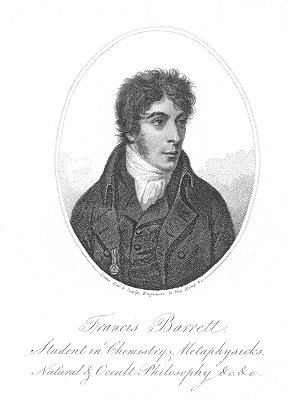Difference between revisions of "Francis Barrett"
Occultwiki (talk | contribs) (Created page with "300px|thumb|Portrait of Francis Barrett '''Francis Barrett''' (born probably in London around 1770–1780, died after 1802) was an English occul...") |
Occultwiki (talk | contribs) |
||
| (One intermediate revision by the same user not shown) | |||
| Line 3: | Line 3: | ||
==Biography== | ==Biography== | ||
Barrett, an Englishman, claimed himself to be a student of chemistry, [[metaphysics]] and natural occult philosophy. He was known to be an extreme eccentric who gave lessons in the magical arts in his apartment and fastidiously translated [[Kabbalah|Kabbalistic]] and other ancient texts into English, such as von Welling's work, ''Philosophy of The Universe'' circa 1735, from German. | Barrett, an Englishman, claimed himself to be a student of chemistry, [[metaphysics]] and natural [[occult]] philosophy. He was known to be an extreme eccentric who gave lessons in the magical arts in his apartment and fastidiously translated [[Kabbalah|Kabbalistic]] and other ancient texts into English, such as von Welling's work, ''Philosophy of The Universe'' circa 1735, from German. | ||
According to his biographer Francis X. King, Barrett's parents were humble folk married in the parish of St. Martin's in the Fields on 29 September 1772. | According to his biographer Francis X. King, Barrett's parents were humble folk married in the parish of St. Martin's in the Fields on 29 September 1772. | ||
==''The Magus''== | ==''The Magus''== | ||
Barrett was enthusiastic about reviving interest in the [[occult]] arts, and published a magical textbook called ''[[The Magus]]''. It was an edited compilation, almost entirely consisting of selections from [[Cornelius | Barrett was enthusiastic about reviving interest in the [[occult]] arts, and published a magical textbook called ''[[The Magus]]''. It was an edited compilation, almost entirely consisting of selections from [[Heinrich Cornelius Agrippa]]'s ''[[Three Books of Occult Philosophy]]'' and Robert Turner's 1655 translation of the ''[[Heptameron|Heptameron of Peter of Abano]]''. | ||
Barrett made modifications and modernized spelling and syntax. Possibly influencing the novelist Edward Bulwer-Lytton, the book gained little other notice until it influenced [[Eliphas Levi]]. | Barrett made modifications and modernized spelling and syntax. Possibly influencing the novelist Edward Bulwer-Lytton, the book gained little other notice until it influenced [[Eliphas Levi]]. | ||
Latest revision as of 03:39, 11 March 2022
Francis Barrett (born probably in London around 1770–1780, died after 1802) was an English occultist.
Biography
Barrett, an Englishman, claimed himself to be a student of chemistry, metaphysics and natural occult philosophy. He was known to be an extreme eccentric who gave lessons in the magical arts in his apartment and fastidiously translated Kabbalistic and other ancient texts into English, such as von Welling's work, Philosophy of The Universe circa 1735, from German.
According to his biographer Francis X. King, Barrett's parents were humble folk married in the parish of St. Martin's in the Fields on 29 September 1772.
The Magus
Barrett was enthusiastic about reviving interest in the occult arts, and published a magical textbook called The Magus. It was an edited compilation, almost entirely consisting of selections from Heinrich Cornelius Agrippa's Three Books of Occult Philosophy and Robert Turner's 1655 translation of the Heptameron of Peter of Abano.
Barrett made modifications and modernized spelling and syntax. Possibly influencing the novelist Edward Bulwer-Lytton, the book gained little other notice until it influenced Eliphas Levi.
The Magus dealt with the natural magic of herbs and stones, magnetism, talismanic magic, alchemy, numerology, the elements, and biographies of famous adepts from history. The book also served as an advertising tool. In it Barrett sought interested people wanting to help form his magic circle. An advertisement in The Magus (Vol. 2, p. 140) refers to an otherwise unknown school founded by Barrett.
